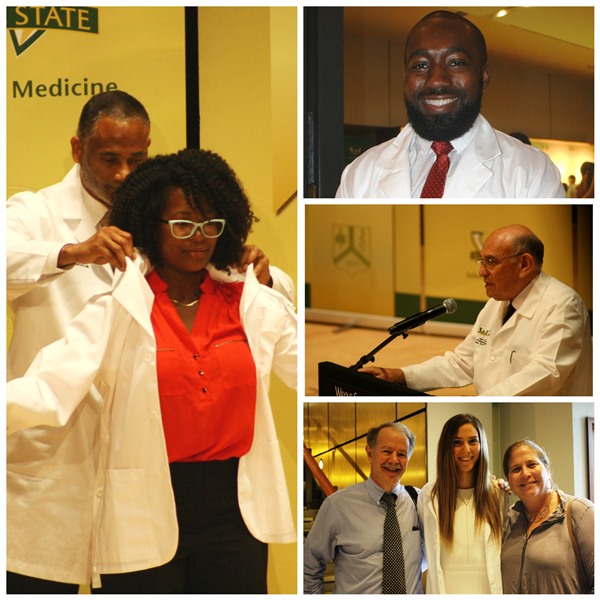
Pictured: Far left, Fatimoh Fagade-Oyedele receives her white coat from Vice Dean for Medical Education Richard Baker, M.D. Above right is Obinna Onyeukwu; middle right, Dean Jack D. Sobel greets the new students and their families; bottom right from left, Peter LeWitt, M.D., student Tessa LeWitt and Janice Eisenstadt, D.O. (More photos available here).
The road may have been winding, and the adventure longer than he initially hoped, but starting medical school as a member of the Wayne State University School of Medicine's Class of 2021 is the perfect end game for Obinna Onyeukwu.
"This is monumental. It has been a long journey," he said.
Onyeukwu grew up on Chicago's north side, the son of Nigerian immigrants. As a child, he mainly focused on sports and less on school, he admitted. He entered the University of Illinois at Champagne as an undergraduate with culture shock, transitioning from a parochial high school with a graduating class of 55 to lecture halls filled with up to 400 people. Someone suggested that perhaps he wasn't cut out for a future in medicine. He graduated in 2011, then earned a master's degree at Tennessee State University, worked as a mental health technician, then was accepted into a post-baccalaureate program at another Illinois university. In between, he studied for and took the MCAT. Three times.
"The timing is right. I got into medical school when I was ready," he said.
At the Wayne State University School of Medicine's annual White Coat Ceremony on July 28, he received an important physical symbol of his chosen path - a short white coat emblazoned with a WSU School of Medicine patch, indicating that he and his 289 colleagues are now medical students. The ceremony was held inside the Max M. Fisher Music Center and Orchestra Hall in Detroit, following two weeks of orientation for the 151 women and 139 men who make up the Class of 2021.
"This will be the best four years of your life," said School of Medicine Dean and Distinguished Professor Jack D. Sobel, M.D., addressing the incoming class. "No profession will offer you this great opportunity to find fulfillment and satisfaction. It is up to us as physicians to look after the vulnerable. This school is different. We have an urban mission dedicated to the residents of this community."
Tessa LeWitt's mother and father, both physicians, knew she would pursue medicine before she did.
"Tessa is a people person. That's why we knew she would be a doctor soon enough," said Peter LeWitt, M.D., a WSU Professor of Neurology who practices with Henry Ford Health System. Tessa's mother, Janice Eisenstadt, D.O., is an infectious disease specialist and clinical pathologist who completed her residency and fellowship at WSU.
"It is definitely a culmination of a lot of hard work, and there has been a lot coming into this. I'm a little nervous, of course," Tessa LeWitt said.
Like many of her new colleagues, Fatimoh Fagade-Oyedele knew in elementary school that she wanted to be a doctor. "Today is a very big deal for me because I have been trying to get here since I was 8 years old," she said.
Fagade-Oyedele was born in Nigeria, and moved to Inkster, Mich., at age 10. Her mother died after they moved. Then, a younger sister had a child. She had to focus less on getting to medical school and more caring for family. She is the first in her family to attend college. She received her undergraduate degree from WSU.
Her classmates, Akhila Nerusu and Manasi Mahajan, also graduated from WSU, in May. The friends met as undergraduates who wanted to attend medical school at their alma mater.
"I'm very glad with the way things turned out," Mahajan said. "It feels surreal to finally start studying what we have wanted to study for such a long time."
During the ceremony, Associate Dean for Admissions Kevin Sprague, M.D., '80, read each student's name as they took the orchestra stage, while Vice Dean for Medical Education Richard Baker, M.D.; Assistant Dean of Student Affairs Margit Chadwell, M.D.; or a physician parent, grandparent, aunt or uncle, sibling or mentor, cloaked them in the hip-length white coat. They also received a handshake and lapel pins from Dean Sobel. New this year, Medical Alumni Association President Brenda Moskovitz, M.D. '83, gave them a card with the name of an individual or organization that generously sponsored their white coat.
The White Coat Ceremony is an international tradition started by the Arnold P. Gold Foundation in 1993 to remind incoming medical students to practice humanistic patient-centered medical care. Events like WSU's ceremony are held at the beginning of the academic year at 97 percent of medical schools accredited by the Association of American Medical Colleges in the United States, as well as Canada and 13 other countries.
"This is a journey of self-discovery. When you put on this coat, you are no longer a student. You are a student doctor," said Paul Thomas, M.D. '13, the ceremony's keynote speaker, Family Medicine physician and owner of Plum Health, a membership-based direct primary care clinic in Detroit. Dr. Thomas received the Gold Humanism Award from the WSU chapter of the Arnold P. Gold Foundation's Gold Humanism Honor Society.
"The people around you are beginning to see the physician you will become. There is no better place to go than Wayne State University," he said.
Classes begin July 31.